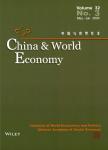China's Sovereign Wealth Fund:Weakness and Challenges
China's Sovereign Wealth Fund:Weakness and Challenges作者机构:Assistant Professor Institute of World Economics and Politics Chinese Academy of Social Sciences Beijing China Associate Professor Institute of World Economics and Politics Chinese Academy of Social Sciences Beijing China
出 版 物:《China & World Economy》 (中国与世界经济(英文版))
年 卷 期:2009年第17卷第1期
页 面:101-122页
核心收录:
学科分类:02[经济学] 0201[经济学-理论经济学] 020105[经济学-世界经济]
主 题:China Investment Corporation external challenge foreign exchange reserve management internal weakness sovereign wealth fund
摘 要:The establishment of sovereign wealth funds in large developing countries has generated hot debate among participants in the international financial market. When accumulated foreign exchange reserves surpass a sufficient and an appropriate level, the costs, risks and impacts of holding reserves on the macroeconomy of a country need to be considered. The Chinese Government established China Investment Corporation ( CIC) in 2007 to diversify its investment of foreign reserves and to raise investment income. However, because of certain conflicts of interest and institution-design caveats, CIC possesses some internal weakness, including a vague orientation, mixed investment strategies and an inefficient bureaucratic style. Although the subprime crisis has softened certain regulations and lessened rejection by the USA of ClC potential investments, the increased volatility and uncertainty of the market means that CIC is facing some new challenges in terms of its investment decisions. Moreover, CIC is competing with other Chinese investment institutions for injections of funds from the Chinese Government.



